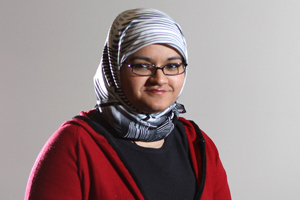Opinion: The hijab – Freedom or oppression?
Fiza Shah
Fiza Shah is a columnist for the Daily Kent Stater. Contact her at [email protected].
Question: Do you find it unfair that Muslim women have to cover so much of their bodies, which seems to have much more to do with male insecurity than spirituality?
–RandomKSUStudent
(For the full question, please refer to the comment section of my previous article).
First of all, what is the hijab?
The word hijab is usually translated into English as “veil.” Different sects of Islam (Shia, Sunni, Wahhabi, etc.) have different ways to wear it. For example, the Shia sect defines it as covering the head and the body, leaving the face and hands uncovered. Regardless of the differences in style, there is one main point: to cover the body in such a way that the woman wearing the hijab doesn’t become the object of unwanted male attention.
Now, some of you might be thinking this is unfair or oppressive. However, this is where the misunderstandings begin.
For me, hijab doesn’t mean oppression at all. Instead, it is a sort of freedom. A freedom I chose to embrace. The reasons why women choose to wear the hijab are numerous, but in this article I have deal with the ones pertaining to respect and equality between men and women.
To begin, let’s lessen the difference between Muslims, Christians and Jews. While the media might portray the relationship between these three religions to be irreconcilable, they actually have much more in common than they do in differences.
For example, all three religions promote some sort of veil in their Holy Books.
Rabbi Dr. Menachem M. Brayer, a professor of Biblical literature at Yeshiva University, writes in his book “The Jewish Woman in Rabbinic Literature” that it used to be expected that a woman cover her head, and even the face (with the exception of her eyes) when in public. It is even quoted in the Torah: “Make for yourselves tassels [g’dilim] on the four corners of the cloak [k’sut] that covers you” (Deuteronomy 22:11 MBV).
The Bible also alludes to the piety of women who do cover themselves. In Book 1 of Corinthian, St. Paul says, “But every woman praying or prophesying with her head uncovered disgraces her head, for it is the same as if she were shaven.” During the time, a woman shaving her head was considered to be extremely disgraceful, so it was expected that they cover themselves.
Even Mary (Peace Be Upon Her), when depicted in the Nativity Scene and other places, is shown with a head covering. This is why nuns, some of the most pious women in Christianity, are shown to wear the habit.
In the Quran, it says in Surah Al-Ahzab (The Confederates) Verse 59, “O Prophet, tell your wives and your daughters and the women of the believers to draw their cloaks close round them (when they go abroad).”
So, why do all three of the monotheistic religions promote this cloth that, for so many, represents inequality, oppression and a backward thinking?
In Islam, the priority of all Muslims, men and women, is to follow the commands of God without faltering. If He says, for example, pray five times a day, Muslims are expected to pray. If He says to cover and conduct yourselves with modesty, then it becomes obligatory to do just that. So, Muslim women wear the hijab not to please men, but rather to please God. This is a concept that is misunderstood in both the East and West.
Hijab, contrary to what is believed, actually creates a level playing field between men and women.
In Islam, it is important that women are seen for their actions, character and thought, not for their appearance. It is unjust for a woman to be objectified.
For example, if she applies for a job, she should be accepted or declined based on qualifications, not her jean size or how low-cut of a shirt she’s willing to wear. The success of a car company shouldn’t be based on how many half-naked blondes they get to surround a car. And women should not be “checked out” as they walk down the street.
In short, women should not be seen as objects.
Secondly, it is not just women that are expected to cover themselves. In fact, men have their own hijab, though it is not so controversial. The revelation regarding the hijab for men came to the Prophet Muhammad (PBUH) before the hijab for women.
In the Quran, it says in Surah Noor (Light) verse 30, “Say to the believing men that they should lower their gaze and guard their modesty: That will make for greater purity for them: and Allah is well acquainted with all that they do.”
So, unlike what most people think, men don’t exactly get off that easy. For men, God commands they look upon women with respect. When they see a woman walking down the street, they must not stare at her, but rather lower their gaze.
They are taught not to not judge a woman by her physique, but rather respect them for their character.
And this, to me, is the essence of respect.
I would like to thank RandomKSUStudent for the well thought-out question.
If you have ANY questions regarding Islam or the Eastern Culture, please email me at [email protected] or post it in a comment below.



